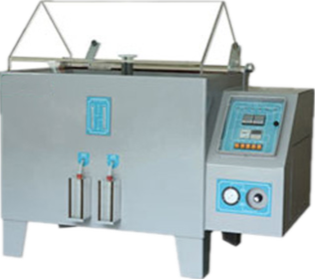
What type of samples can be tested using the ASTM B117 salt spray test?
2023/11/22
The ASTM B117 salt spray test can be applied to a wide range of samples, including various materials and surface coatings. The versatility of the test makes it a valuable tool for assessing the corrosion resistance of different materials in diverse industries. Here's a detailed overview of the types of samples that can be tested using the ASTM B117 salt spray test:

1. Metallic Materials:
-
Ferrous Metals (Iron and Steel): Commonly used in automotive, construction, and marine applications, ferrous metals are susceptible to corrosion. The salt spray test assesses the effectiveness of protective coatings on these materials.
-
Non-Ferrous Metals (Aluminum, Copper, Brass): Aluminum, copper, and brass components used in various industries undergo the salt spray test to evaluate the durability of protective coatings and their resistance to corrosion.
2. Coated Materials:
-
Paints and Coatings: The test is widely employed to evaluate the corrosion resistance of painted or coated surfaces, such as those found on vehicles, machinery, and infrastructure. It helps in selecting coatings that provide effective protection against corrosion.
-
Galvanized Coatings: Galvanized steel, where a layer of zinc is applied to protect against corrosion, is subjected to the salt spray test to ensure the durability and longevity of the coating.
-
Anodized Aluminum: Anodized aluminum surfaces, commonly used in aerospace and architectural applications, can be tested to assess the corrosion resistance of the anodized layer.
-
Electroplated Finishes: Various electroplated finishes, such as chrome or nickel plating on automotive components, undergo the salt spray test to determine their corrosion resistance.
-
Powder Coatings: Powder-coated surfaces, frequently used in appliances, automotive parts, and outdoor furniture, are tested to assess the integrity of the powder coating under corrosive conditions.
3. Automotive Components:
-
Body Panels: Automotive body panels, including those made of steel or aluminum, are tested to ensure that they can withstand exposure to salt spray, which is particularly relevant in regions where roads are treated with de-icing salts.
-
Fasteners and Hardware: Nuts, bolts, screws, and other fasteners used in automotive and marine applications are subjected to the salt spray test to assess their corrosion resistance and ensure reliable performance.
4. Aerospace Components:
-
Aluminum Alloys: Components made from aluminum alloys, commonly used in aerospace applications, undergo the salt spray test to evaluate the effectiveness of protective coatings in preventing corrosion.
-
Coated Surfaces: Aerospace coatings, including those used on aircraft exteriors, are tested to meet industry standards and ensure that they can withstand the corrosive effects of high-altitude and maritime environments.
5. Marine Equipment:
-
Stainless Steel Components: Stainless steel components used in marine environments, such as boat fittings and marine hardware, are subjected to the salt spray test to assess their corrosion resistance.
-
Corrosion-Resistant Alloys: Alloys designed to resist corrosion in marine environments, like those used in shipbuilding, are tested to verify their performance and compliance with industry standards.
6. Electrical and Electronic Components:
-
Printed Circuit Boards (PCBs): Electronic components, especially those exposed to outdoor conditions, undergo the salt spray test to ensure the corrosion resistance of the materials used in their construction.
-
Connectors and Contacts: Electrical connectors and contacts, particularly those used in outdoor or harsh environments, are tested to assess their resistance to corrosion and ensure reliable electrical performance.
7. Building Materials:
-
Architectural Metals: Metal components used in architectural applications, such as window frames, façade elements, and structural elements, are tested to ensure their resistance to corrosion in various environmental conditions.
-
Outdoor Furniture: Metal or coated surfaces of outdoor furniture are subjected to the salt spray test to assess their durability and corrosion resistance, especially in locations with high humidity or salt exposure.
8. Medical Devices:
-
Surgical Instruments: Stainless steel or other metallic components of surgical instruments may be tested to ensure their corrosion resistance, critical for maintaining hygiene and preventing contamination.
-
Biocompatible Coatings: Coatings on medical devices, designed to be biocompatible and corrosion-resistant, can be evaluated using the salt spray test to ensure their performance in clinical environments.
9. Consumer Goods:
-
Appliances: Metal parts of appliances, such as washing machines, refrigerators, and ovens, may undergo the salt spray test to ensure their resistance to corrosion, especially in humid or coastal areas.
-
Sporting Equipment: Outdoor sporting equipment made from metals or coated materials, like bicycles or camping gear, can be tested to verify their durability under corrosive conditions.
10. Military and Defense Equipment:
-
Weaponry and Ammunition: Components of military equipment, including firearms and ammunition, are subjected to the salt spray test to ensure their reliability and functionality in various environmental conditions.
-
Vehicles and Equipment: Military vehicles and equipment, exposed to diverse and often harsh environments, undergo the salt spray test to assess the durability of their materials and coatings.
Conclusion:
The ASTM B117 salt spray test is a versatile method applicable to a broad spectrum of samples, ranging from metals and coatings to various finished products across different industries. By subjecting these samples to a controlled corrosive environment, the test provides valuable insights into their corrosion resistance, aiding in material selection, quality assurance, and the development of durable products for diverse applications.
Previous: What's the different methods used to measure slip resistance according to ASTM?
N e x t : ASTM E-84 fire rating test: indispensable for building construction



